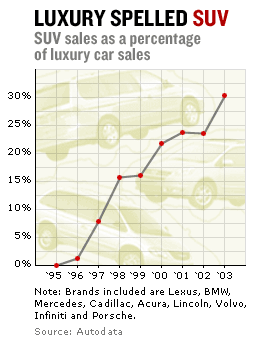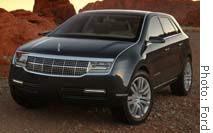DETROIT (CNN/Money) - Today, success in the once quiet luxury car market can be spelled with three letters: SUV
A few years ago it was an oxymoron. Luxury car makers made cars. SUVs, on the other hand, are trucks. Talk of a Cadillac SUV would have elicited a "What?" A Porsche SUV would have been unthinkable.
Things have changed a lot.
"No one at these brands in their wildest imaginations thought they would be building SUVs 10 years ago," said David Cole, chairman of the Center for Automotive Research. "But once they were introduced, they took off like a rocket. Now SUVs are as significant a part of the luxury brands as the four-door sedan.

Overall, there was a 1 percent decline in luxury car sales during 2003 -- just less than 1 million cars sold. And SUV sales outside of the luxury segment were basically flat.
But SUVs from the luxury brands grew at almost 40 percent to more than 430,000 vehicles, and that's not even counting the contribution of high-priced SUV-only brands like Hummer and Land Rover. Overall, about 30 percent of major luxury brands' U.S. sales are now SUVs.
Luxury car executives say that their SUVs are a choice for both traditional SUV buyers moving up in brand and traditional luxury car buyers looking for more room. But data from CarsDirect.com shows that most luxury SUV buyers are comparing those vehicles to other SUVs, including the lower-priced models. Most are not shopping among luxury cars. Thus the SUV is becoming the key to bringing new customers to the luxury dealerships.
That also means, though, that luxury SUVs are bringing luxury car makers into unfamiliar competitive waters. In the past, someone shopping for a Lincoln might also have been looking at a Cadillac. Now, he might also be looking at a far less expensive Ford Explorer.
Trend less than 10 years old
The first luxury SUV was Honda Motor Co.'s Acura SLX, which debuted in late 1995.
"I think people knew that luxury buyers wanted something with more room and they wouldn't be happy with a minivan," said John Watts, manager of product planning at Acura.
Now virtually every luxury brand other than Rolls Royce and Jaguar has an SUV offering. Saab announced its SUV plans last month, saying its research showed 29 percent of buyers leaving that General Motors Corp. brand were going to an SUV.
Luxury-sector sales leader Lexus, which has used its SUV offerings to lift it into first place for each of the last four years, saw a better than 50 percent increase in SUV sales last year. It marked the second time in its history -- the other was 2000 -- that the Toyota Motor Corp. luxury brand sold more SUVs than cars.
Lincoln, which rolled out the Aviator mid-size SUV in late 2002, used that and a healthy 26 percent growth in sales of its full-size Navigator to nearly double SUV sales. That let it overcome a 21 percent drop in car sales. It now sees 43 percent of its sales from SUVs.
Even Cadillac, somewhat late to the SUV game with a 1999 rollout of its Escalade, has more than 20 percent of its sales in light trucks, and would have seen a drop in sales without a 48 percent jump in SUV sales last year.
 |
|
| Lincoln Aviator concept vehicle |
German luxury sports car maker Porsche is on the road to being primarily an SUV brand. It's Cayenne SUV, introduced in the United States in March, accounted for 45.5 percent of its U.S. sales despite getting a late start. Porsche decided to make an SUV when its research showed 45 percent of Porsche owners also had an SUV.
New models on the way
At this week's show, Lincoln showed a concept version of a new Aviator, which would no longer be mistaken for a spruced up Explorer or Mercury Mountaineer. It would give Lincoln its first car-based SUV. It hasn't given a time frame for the new version yet, but the design gives assurances to critics of the current Aviator that Lincoln is committed to the mid-size SUV segment. The current Aviator lost sales to the very similar Mercuy Mountaineer, with which it shared showroom space.
Lexus unveiled a new version of its RX, the RX 400h, which would use a hybrid gas and electric engine to both boost performance and give it the fuel economy of an economy car.
"We think this (hybrid) will open things up for Lexus," said Lexus Vice President of Marketing Mike Wells. "Our data shows that the two areas luxury SUV buyers are dissatisfied with are miles per gallon and what the impact on the environment. It's not that they can't afford the gas. It's the trips to the gas station. You give them 600 miles between fill-ups, eliminate half my trips to the gas station, that saves me time. That improves my life."

|